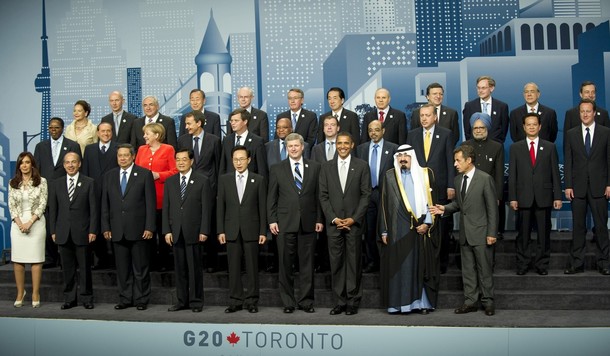
To spend to encourage growth, or to cut spending to reduce debt? That is the question facing the world’s leading economies. As Howard Schneider of the Washington Post puts it, “In economic terms, it is a bit like creating a perpetual motion machine – cutting tens of billions of dollars in public spending would almost certainly slow growth but is considered necessary to tame record levels of government debt.”
At the conclusion of the G-20 summit in Toronto over the weekend, members agreed to deficit-reduction targets, and announced their intent to pursue higher capital requirements for banks only when economic recoveries have progressed. The advanced G-20 economies set a goal of cutting budget deficits in half by 2013, and starting to stabilize debt-to-output ratios by 2016 (meaning that developing countries like India or Poland wouldn’t be subject to fiscal restraints). Countries will be allowed to institute reforms at their own pace and can see through existing stimulus plans, but the G-20 also recommended deficit reductions be “calibrated” to avoid harming growth.
British Prime Minister David Cameron promoted deficit reduction: “Those countries that have big deficit problems like ours have to take action in order to keep that level of confidence in the economy which is absolutely vital to growth.” Jean-Claude Trichet, head of the European Central Bank has said “the idea that austerity measures [i.e., spending cuts] could trigger stagnation is incorrect,” as the U.S. claims.
Rym Ayadi, senior fellow at the Center for European Policy Studies in Brussels, concurs with the U.S. contention that spending cuts will hold back economic growth but believes countries must cut deficits. “Unemployment is more than 10 percent in many countries, in Spain it is 20 percent. We see social forecasts in which this may not improve, which means lower revenue in five years. There could be another Greece. Yes, I agree with the US there will be an impact on global recovery. But [EU nations] have no other choice.”
Meanwhile similar to the budget debate, G20 members disagree as to whether measures to limit risks banks take could endanger growth by limiting spending. European countries are especially concerned about the impact new bank rules would have, as indicated in BBC Business Editor Robert Peston’s blog (as opposed to the U.S. which supports banking restrictions):
[Bankers’] fear was that immediate implementation of [stricter bank regulations] would undermine the world’s fragile economic recovery: in that when they are forced to hold more capital relative to their loans, it typically becomes more expensive for them to provide credit to businesses and households. This was a sharp concern of banks and governments in the eurozone, because their banks hold relatively less capital and play a particularly central role in financing the economy. Even so banks will be concerned at the tough language of the leaders’ communique, which implies that as and when the new rules are fully implemented, they’ll have to hold perhaps four or even five times as much capital as they did before the crisis.
So, like the Copenhagen climate conference last December, this G20 summit was a lot of talk with little substance. The summit produced only tentative goals lacking specificity and not even complete agreement on even those. Rather than firm rules applicable to all members to get the global economy back on track and ensure a crisis will never happen again, the parties all agreed to do what they were already doing.
Cameron, sensing the futility of the meeting before it started, accurately predicted what would happen: “Too often, these international meetings fail to live up to the hype and the promises made. I’m sure other leaders would admit that. A lot of money is spent laying them on. Host cities are disrupted for days or even weeks. The cavalcades roll into town. Good intentions are shared in productive talks. Then, somehow, those intentions rarely seem to come to fruition in real, tangible global action.”
Clive Crook, Financial Times columnist and former deputy editor of The Economist, is equally pessimistic. “The main bone of contention in Toronto was fiscal policy. Here, I would argue, simple ineptitude seems to be a bigger problem than disinclination to co-operate…In 2010 …some countries still have room for fiscal manoeuvre. Others have less and some have none. Co-operation is therefore more difficult – and, you could argue, more necessary.”
Scott Bleiweis is an intern with The Atlantic Council editorial office. He is currently pursuing a masters degree in International Studies with the Korbel School of International Studies at the University of Denver. Photo credit: Getty Images.
Image: g20%20summit.jpg
